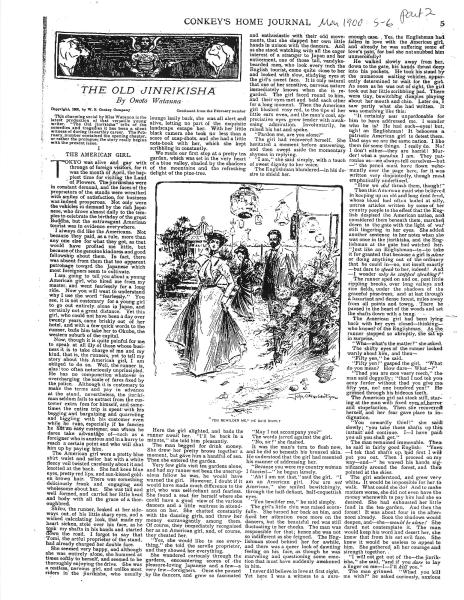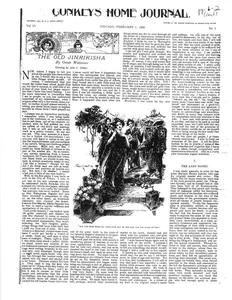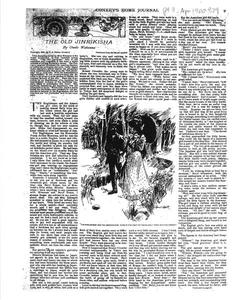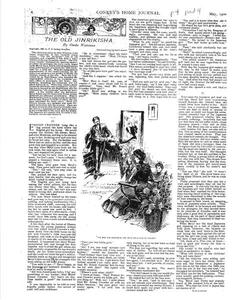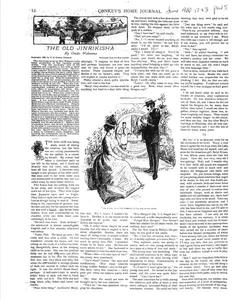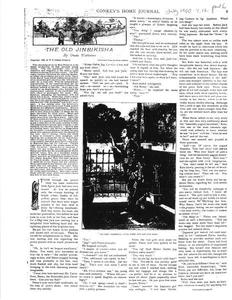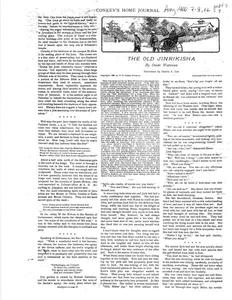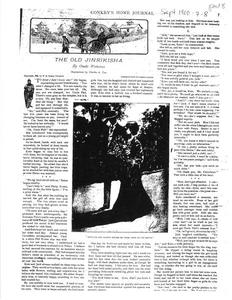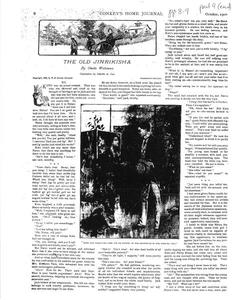I
The American Girl.
Tokyo was alive and gay with throngs of foreign visitors, for it was the month of April, the happiest time for visiting the Land of Flowers. The jinrikishas were in constant demand, and the faces of the proprietors of the stands were wreathed with smiles of satisfaction, for business was indeed prosperous. Not only were the vehicles in demand by the rich Japanese, who drove almost daily to the temples to celebrate the birthday of the great Buddha, but the extravagant American tourist was in evidence everywhere.
I always did like the Americans. Not because they paid, as a rule, more than any one else for what they got, as that would have profited me little, but because of the genuine kindness and good fellowship about them. In fact, there was absent from them that too apparent patronage toward the Japanese which most foreigners seem to cultivate.
I am going to tell you about a young American girl, who hired me from my master, and went fearlessly for a long ride. Now you will want to understand why I use the word “fearlessly.” You see, it is not customary for a young girl to go out entirely alone in Japan, and certainly not a great distance. Yet this girl, who could not have been a day over twenty years, came briskly out of her hotel, and with a few quick words to the runner, bade him take her to Okubo, the western suburb of the capital.
Now, though it is quite painful for me to speak at all ill
1 of those whose business it is to take charge of me and my kind, that is, the runners, yet to tell my story about this American girl, I am obliged to do so. Well, the runner is, alas! too often notoriously unprincipled. He has no compunction whatever in overcharging the scale of fares fixed by the police. Although it is customary to make the terms and pay in advance at the stand, nevertheless, the jinrikiman seldom fails to extract from the customer extra fees for himself, and sometimes the entire trip is spent with his begging and bargaining and quarreling and higgling with his customer even while he runs, especially if he fancies he has an easy customer, one whom he dares take advantage of—-such as a foreigner who is anxious and in a hurry to reach a certain point and who will shut him up by paying him.
The American girl wore a pretty blue shirt waist and sailor hat with a white fleecy veil twisted carelessly about it and knotted at the back. She had keen blue eyes, pretty red lips, and sun-kissed golden brown hair. There was something deliciously frank and engaging and wholesome about her. She was tall and well formed, and carried her little head and body with all the grace of a thoroughbred.
Shiku, the runner, looked at her sideways out of his little sharp eyes, and a wicked calculating look that made my heart sicken stole over his face, as he took my shafts in his hands and started down the road. I forgot to say that Tomi, the artful proprietor of the stand, had already charged her double fare.
She seemed very happy, and although she was entirely alone, she hummed at times softly to herself, and seemed to be thoroughly enjoying the drive. She was a restless, nervous girl, and unlike most riders in the jinrikisha, who usually lounge lazily back, she was all alert and alive, letting no part of the exquisite landscape escape her. With her little black camera she took no less than a score of snap shots, and she had a little note-book with her, which she kept scribbling in constantly.
We made our first stop at a pretty tea garden, which was set in the very heart of a blue valley, shaded by the shadows of the mountains and the refreshing delight of the pine tree.
Here the girl alighted, and bade the runner await her. “I’ll be back in a minute,” she told him pleasantly.
The man begged for drink money. She drew her pretty brows together a moment, but gave him a handful of sen. Then she entered the garden.
Very few girls visit tea gardens alone, and had my runner not been the unscrupulous fellow he was, he would have warned the girl. However, I doubt if it would have made much difference to the girl, who was self-reliant and fearless. She found a seat for herself where she could have a good view of the various dancers and a little waitress in attendance on her. She chatted constantly with the dancing girls, and threw her money extravagantly among them. Of course, they immediately recognized her as an American girl, and, of course, they cheated her.
“Yes, she would like to see everything,” she told the servile proprietor, and they showed her everything.
She wandered curiously through the gardens, encountering scores of the pleasure-loving Japanese and a few--a very few—-foreigners. Once she paused by the dancers, and grew so fascinated and enthusiastic with their odd movements, that she clapped her own little hands in unison with the dancers. And as she stood watching with all the eager interest of a stranger to Japan and her enticement, one of those tall, Vandyke-bearded men, who look every inch the English tourist, came quite close to her and looked with slow, studying eyes at the girl’s sweet face. It is only natural that one of her sensitive, nervous nature immediately knows when she is regarded. The girl faced round to him, and their eyes met and held each other for a long moment. Then the American girl blushed rosy red, to the tips of her little ears even, and the man’s cool, appreciative eyes grew tender with awakening admiration. Involuntarily, he raised his hat and spoke.
“Pardon me, are you alone?”
The girl had recovered herself. She hesitated a moment before answering, and then swept aside the momentary shyness in replying.
“I am,” she said simply, with a touch of sweet dignity to her voice.
The Englishman blundered—-in his desire to shield her.
“May I not accompany you?”
The words jarred against the girl.
“No, sir!” she flashed.
It was the man’s turn to flush now, and he did so beneath his bronzed skin. He understood that the girl had resented his manner of addressing her.
“Because you were my countrywoman I fancied—-” he began lamely.
“Ah! I am not that,” said the girl.“I am an American girl. You are not American,” she smiled bewitchingly, through the half-defiant, half-coquettish eyes.
“You bewilder me,” he said simply.
The girl’s little chin was raised scornfully. She turned her back on him, and fixed her attention once more on the dancers, but the beautiful red was still fluctuating in her cheeks. The man was responsible for that; hence she was not so indifferent as she feigned. The Englishman stood behind her for a while, and there was a queer look of dawning feeling on his face, as though he was marveling and questioning some emotion that must have suddenly awakened in him.
I never did believe in love at first sight. Yet here I was a witness to a sure-enough case. Yes, the Englishman had fallen in love with the American girl, and already he was suffering some of love’s pain, for had she not snubbed him unmercifully?
He walked slowly away from her, down to the gate, his hands thrust deep into his pockets. He took his stand by the numerous waiting vehicles, apparently determined to wait for the girl. As soon as he was out of sight, the girl took out her little scribbling pad. There were tiny, bewitching dimples playing about her mouth and chin. Later on, I saw partly what she had written. It was something like this:
“It certainly was unpardonable for him to have addressed me. I wonder who he is? He had such—-eyes! but, ugh! An Englishman! It behooves a patriotic American girl to detest them. Dad says we are the same nation. I like them for some things. I really do. No! I don’t either—-they are horrid! Murder! what a paradox I am. They patronize us—-we always tell ourselves—-but—-” the pencil must have flown vehemently over the page here, for it was written very disjointedly, though most emphatically underlined.
“How we did thrash them, though!”
Then this American maid, who believed in keeping up an old and long-dead feud, whose blood had often boiled at silly, untrue articles written by some of her countrypeople to the effect that the English despised the American nation and considered them beneath them marched down to the gate with the light of war still lingering in her eyes. She added another sentence to her notes when she was once in the jinrikisha, and the Englishman at the gate had watched her. “Just like an Englishman—-to—-to take it for granted that because a girl is alone or doing anything out of the ordinary that he could in—-no, not insult exactly—-but dare to speak to her, indeed! And—-I wonder why he stopped speaking?”
The runner sped on and on, past little rippling brooks, over long valleys and rice fields, under the shadows of the graceful pine-trees, and at last through a luxuriant and dense forest, miles away from all points and towns. There he paused in the heart of the woods and set the shafts down with a bang.
The American girl had been lying back with her eyes closed—-thinking—-who knows? of the Englishman. As the runner stopped so abruptly, she sat up in surprise.
“Wha—what’s the matter?” she asked.
The shifty eyes of the runner looked warily about him, and then—-
“Fifty yen,” he said.
“Fifty yen!” gasped the girl. “What do you mean? How dare—-What—-?”
“Thad you are mos’ vaery reech,” the man said doggedly; “thad I nod tek you aeny furder without thad you give me fifty yen, no! one hundred yen!” He grinned through his hideous teeth.
The American girl sat stock still, staring at the man with fixed eyes of horror and stupefaction. Then she recovered herself, and her fear gave place to indignation.
“You cowardly thief!” she said slowly; “you take those shafts up this instant and continue. I—-I have paid you all you shall get.”
The man remained immovable. Then he said in fairly good English: “Yaes—-I tek thad shafts up, bud first I will put you out. Then I proceed on my way—-and—-” he waved his hands significantly around the forest, and then pointed at the skies.
The girl understood, and grew very white. It would be impossible for her to walk. What could she do? And to make matters worse, she did not even have the money wherewith to pay him had she so desired. She had exhausted her little fund in the tea garden. And then the forest! It was about four in the afternoon already. Soon the shadows would deepen, and-—she—-would be alone! She dared not contemplate it. The man would keep his word and desert her, she knew that from his set, evil face. She knew it would be useless to appeal to him. She gathered all her courage and strength together.
“I will not get out of the—-the jinrikishas,” she said, “and if you dare to lay a finger on me—-I—I’ll kill you.”
The man grinned. “Whad you kill me with?” he asked curiously, anxious
6 to know whether she carried any weapon with her. A Japanese woman might have carried a small sword or dagger. The girl fell into the trap and betrayed herself, and he knew she was defenseless.
“With my hands,” she said, with intrepid bravery. “You miserable, skinny, little rat, you. An American girl could—-could—-is stronger than you,” but she was measuring his little form with despairing eyes, even while she attempted to frighten him.
For answer the runner took hold of my shafts and quietly turned me sideways, holding me in his perilous position for fully two minutes, while the girl clung desperately to the sides.
“You pay thad moaneys?” he grinned, enjoying her evident fear of falling.
“I will not.” She was not tamed yet by any means.
“Then I will—-whad you call thad—-dump you.”
“Wait!”
The man thought she would now pay. He put me back in position, and the girl quickly alighted and advanced toward him.
“Do you know that my—-my friends and relatives will miss me soon, and come to look for me—-you will be punished—-and—-”
“Thad so? Well, I thing I go nudder city with thad moaneys you goin’ ter pay me.”
“Oh!”
He assured an attitude of impatience and took my shafts up. “An’ thad you nod goin’ ter pay me, I kin go nudder city where the perlice noto onderstan. I waid long time now, and wish you goon-nide.”
“Oh! no! no! no! no!” the girl clung to my shafts pitifully, and tried to hold him.
“You shall not go—-leave me alone—-yet,” she said breathlessly.
And now they were both fighting for my shafts. Her little delicate hands clung madly, feverishly to them, and tried to wrestle with him for them. She must have felt that so long as she could hold me he would not leave her alone. The man belonged to the very lowest type of the ruffian. The girl was almost his match in strength. Finding that he could not wrest the shafts from the girl, and being somewhat fearful of her strength, he sought a fiendish method of taking her by surprise with pain and then dashing for his liberty. He bit one of her little tightly clasped hands. And then the American girl screamed—-screamed aloud:
“Help! help! oh, help! Fire! Murder! Thief! Help!”
Darkness was already at hand. Only a few rays of the dying sunset crept through the forest and spread a melancholy stray gleam of light. But a voice, a full manly voice answered that frantic cry, and the voice was close at hand!
A minute after strong hands were laid on the runner, and the distracted girl was clinging, pitifully, unconscious of what she was doing, to a big stranger, and she was sobbing like a child against his shoulder.
It was the Englishman, and he let the girl cry on her, heart out, in his arms—-nay! I believe he encouraged her to do so.
Then when she had quieted down, he led her gently to his own kurumma, and walked up to the new shivering runner, who was being held by two of his kurummayas. No explanation from the girl was needed. He already understood. Perhaps had anticipated it somewhat, for he had deliberately followed the road her runner had taken. With his hand on the collar of the wretched, shivering, cringing runner, he marched him over to the girl.
“I shall give him the damnedest2 thrashing he ever had in his life,” he said.
“Then when we get to Tokyo, I’ll hand him over to the police.”
The girl recognized his voice, and in the semi-darkness saw his tall, goodly form beside the vehicle.
“You—-you—-Englishmen—-are—-are so good—-and—-and brave,” she said between her sobs. Then she added timidly: “I—-I-—don’t you recognize me?”
She had forgotten what he had said about the runner.
“Yes—-I spoke to you—-tried to warn you in the tea garden. I am afraid I offended you. I beg your pardon. The runner—-” She felt instinctively that he was smiling in despite of the situation, and she laughed a trifle hysterically herself.
“Let him go,” she shivered; “it would do no good.”
“Yes,” there was a queer note in his voice now, “I—-er—-believe I will. He—-ah-—may have done me a service, you know.”
“And me,” she breathed very gently.
The Englishman released his hold on the runner’s collar, and in the darkness found the girl’s little grateful hand extended.
